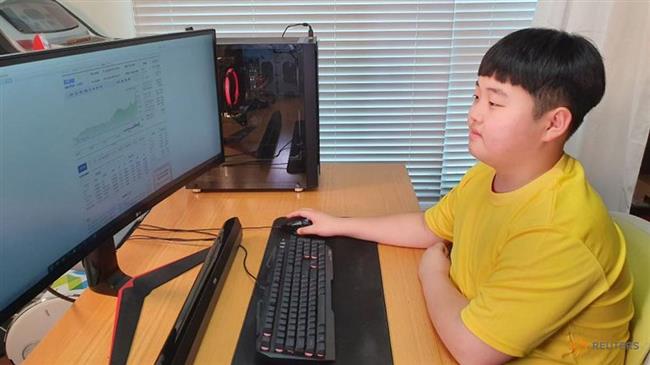South Korean boy investor with 43% gains is new retail trading icon
Watching the business news first thing is a new routine for 12-year-old South Korean Kwon Joon, as he dreams of becoming the next Warren Buffett after earning stellar returns of 43% from a hobby picked up just last year: buying stocks.
Kwon pestered his mother to open a retail trading account last April with savings of 25 million won ($22,400) as seed money, just as the benchmark KOSPI index began recovering from its biggest dip in a decade.
“I really talked my parents into it, because I believed an expert who was saying (on TV) that this is a once-in-a-decade opportunity,” said Kwon, who rode the steepest jump by year-end among MSCI’s country indexes..
“My role model is Warren Buffett,” he added, in a reference to the U.S. billionaire investor.
“Rather than short-term focused day trading, I want to keep my investment for 10 to 20 years with a long-term perspective, hopefully to maximize my returns.”
South Korea’s rookie investors like Kwon, who pursues “value investing” in blue chip shares with funds garnered from gifts, trading mini-car toys and running vending machines, have led the blistering rise of retail trade amid the coronavirus pandemic.
More retail investors are teenagers or even younger, making up more than two-thirds of the total value traded in the nation’s shares, versus less than 50% in 2019.
The trend has grown as equity markets lure parents disillusioned with the education system and millennials working from home.
“I wonder, in this day and age, whether a college degree would be all that important,” said Kwon’s mother, Lee Eun-joo, who fuelled his passion by looking to expose him to business rather than tuition, seen as key to getting ahead in academics.
“Because we live in a different world now, it could be better to become an ‘only-one’ kind of person,” added Lee, who feared even a good schooling might not arm her son against dwindling job opportunities.
About 70% of the 214,800 stock brokerage accounts for minors at Kiwoom Securities, South Korea’s most retail-friendly brokerage, with a market share of more than a fifth, were set up in January 2020 or after, its data shows.
Kwon, with time on his hands during last year’s school closures for the pandemic, drew up a wish list of purchases, which he made during market corrections.
These ranged from South Korea’s largest messenger app operator Kakao Corp., to the world’s biggest memory chip maker Samsung Electronics Co., and Hyundai Motor.
Kwon’s success also reflects the employment challenges for young South Koreans, with one in four out of work by January, the worst level on record, despite being among the most highly educated cohort in the OECD club of advanced nations.
Three-quarters go on to college after high school, versus the grouping’s 44.5% average, but finding rewarding, creative work is tough. “There aren’t enough jobs for college graduates, so many are opting out to diversify their career path early,” said vocational researcher Min Sook-weon.
That is something Kwon understands.
“Rather than going to good schools like the Seoul National University, I’d rather become a big investor,” he said. “I also hope to do a lot of charity work.”
($1=1,115.1600 won)
(Source: Reuters)
VIDEO | Press TV's news headlines
VIDEO | Westerners relocating to Russia in search of better life
VIDEO | Calls for release of 18 Palestine Action activists
VIDEO | Thousands gather in Seoul for rival protests
France’s hosting of anti-Iran terrorists’ meeting example of ‘clear support for terrorism’: Official
Colombia University professor forced to resign over support for pro-Palestinian activism
Iranian father, son to return to Islamic Republic after being confronted by militants in Syria
VIDEO | Cutting Palestinians’ lifeline












 This makes it easy to access the Press TV website
This makes it easy to access the Press TV website